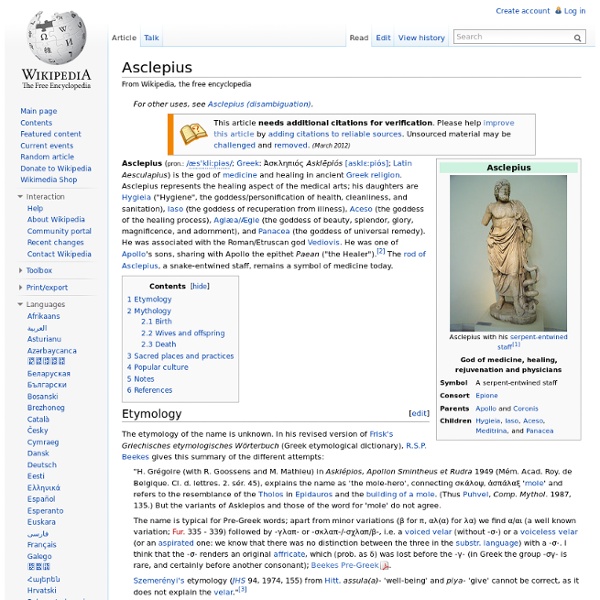www.ancient
Asclepius was the ancient Greek god of medicine and he was also credited with powers of prophecy. The god had several sanctuaries across Greece; the most famous was at Epidaurus which became an important centre of healing in both ancient Greek and Roman times and was the site of athletic, dramatic, and musical Games held in Asclepius’ honour every four years. Asclepius In Mythology In Greek mythology Asclepius (or Asklepios) was a demi-god hero as he was the son of divine Apollo, and his mother was the mortal Koronis from Thessaly. In some accounts Koronis abandoned her child near Epidaurus in shame for his illegitimacy and left the baby to be looked after by a goat and a dog.
asclepius.html
Asclepius was the ancient Greek god of medicine, son of the god Apollo and Coronis, the daughter of Phlegyas, King of the Lapiths. He was married to Epione, the goddess of soothing; together, they had a number of children; their daughters were Panacea (goddess of medicines), Hygeia (goddess of health), Iaso (goddess of recuperation), Aceso (goddess of the healing process), Aglaea or Aegle (goddess of magnificence and splendor). They also had four sons; Machaon and Podalirius were legendary healers who fought in the Trojan War; Telesphorus who accompanied his sister, Hygeia, and symbolised recuperation; and Aratus. Asclepius was given to the Centaur Chiron, who raised him and taught him medicine and the healing arts. At some point, Asclepius healed a snake, which in return taught him secret knowledge - snakes were considered divine beings that were wise and could heal.
www.britannica
Asclepius, Greek Asklepios, Latin Aesculapius, Greco-Roman god of medicine, son of Apollo (god of healing, truth, and prophecy) and the mortal princess Coronis. The Centaur Chiron taught him the art of healing. At length Zeus (the king of the gods), afraid that Asclepius might render all men immortal, slew him with a thunderbolt. Apollo slew the Cyclopes who had made the thunderbolt and was then forced by Zeus to serve Admetus.
asclepius
God of Medicine All traditional cultures have some personification of the Divine Healer or miracle working physician. The ancient Greeks had Asclepius, the god of medicine. In Homer's Iliad, Asclepius was a man, a physician to soldiers wounded on the battlefield at Troy. But by Hippocrates' day, he had become elevated to the status of a god. Actually, Asclepius was a demigod, born of a divine father,Apollo, and a mortal mother, Coronis.
Asclepius
Asclepius is the god of healing. His mother dies before he is born When Asclepius was still in the womb, Apollo killed his mother Coronis 2 for having wedded Ischys. As for the crow who told the god about the wedding, Apollo cursed it, changing its color from white into black.
www.ancient-origins
The Rod of Asclepius remains a symbol of health and medicine around the world to this day. Asclepius was a demi-god son of Apollo who developed such incredible powers of healing under the tuition of both his father and the centaur Chiron, that even Zeus felt threatened that he might achieve immortality for mankind. His legendary healing abilities are why the Rod of Asclepius continues to be a famous symbol associated with healthcare to this day. The Rod of Asclepius
www.sciencedirect
11.1 Influences Mithridates was aware that his land was the home of the mythical witch Medea, adept in poisons and magic. Medea was said to tame unquenchable flames from the petroleum pools of Baku on the Caspian Sea, and her potions were said to bestow superhuman powers, deathlike sleep, or immunity from fire or sword. She also knew the secrets of deadly “dragon’s blood” (a name for the toxic mineral realgar) and all the antidotes for serpent venom, secrets eagerly sought by young Mithridates, future toxicologist (Mayor, 2010). Mithridates’ own grandfather, King Pharnaces I of Pontus, was credited with the discovery of a “panacea” (cure-all, centaury plant, Pliny 25.79).
www.thoughtco
While the healing god Asclepius is not a major player in Greek mythology, he is a pivotal one. Counted as one of the Argonauts, Asclepius came into contact with many of the major Greek heroes. Asclepius was also a causal figure in a drama played out between Apollo, Death, Zeus, the Cyclops, and Hercules. This story comes to us through Euripides' tragedy, Alcestis. The Parents of Asclepius Apollo (the brother of the virginal goddess Artemis) was no more chaste than any of the other (male) gods.



